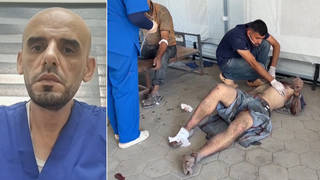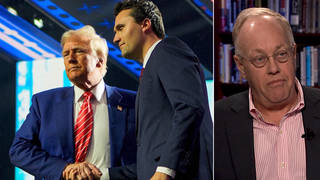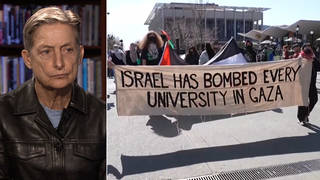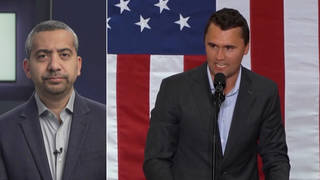
Topics
Guests
- Alex GibneyAcademy Award-winning filmmaker and director of the HBO documentary film The Forever Prisoner.
We speak with Academy Award-winning filmmaker Alex Gibney on his new film, “The Forever Prisoner,” which follows the story of Guantánamo prisoner Abu Zubaydah, who was the first so-called high-value prisoner subjected to the CIA’s torture program and has been indefinitely imprisoned since 2006 without charge. Nearly two decades after the start of the U.S. so-called war on terror, there are still 39 people detained in Guantánamo, where for years prisoners have detailed rampant torture and other horrific conditions. The Biden administration has so far refused to outline a clear plan and timeline for Guantánamo’s closure.
Transcript
AMY GOODMAN: This is Democracy Now! I’m Amy Goodman.
We end today’s show looking at one of the last 39 people still imprisoned at Guantánamo nearly two decades after the start of the so-called war on terror. This week, the Senate Judiciary Committee held a hearing about closing Guantánamo, the first hearing on the issue in eight years. The Biden administration declined to send a witness to testify and has so far failed to outline a clear plan and timeline for Guantánamo’s closure.
Since it opened in 2002, Guantánamo prisoners have detailed rampant torture and other horrific treatment while in U.S. custody, conditions many say amount to human rights violations and war crimes. One of them is Abu Zubaydah, whose story is featured in the new HBO documentary film The Forever Prisoner. This is the trailer.
UNIDENTIFIED: In 2002, FBI and CIA agents thought they had nabbed a diabolical al-Qaeda mastermind. Abu Zubaydah has never been charged with a crime. He was imprisoned in the secret CIA unit called Strawberry Fields — as in forever.
DANIEL JONES: Prior to 9/11, the CIA never captured or detained anybody. They weren’t prepared.
LAWRENCE WILKERSON: People started looking for who was best to interrogate, and there weren’t any.
UNIDENTIFIED: Psychologist James Mitchell was the only candidate considered.
JOSE RODRIGUEZ JR.: I just took it for granted that they knew what they were doing.
UNIDENTIFIED: The CIA officers were certain he was holding back, because he wasn’t telling them what they wanted to hear.
JOHN RIZZO: Something more aggressive had to be done.
LAWRENCE WILKERSON: The lawyer’s philosophy is, “Tell me what you want to do, boss, and I’ll make it legal.”
JOSEPH MARGULIES: We asked him to draw what was done to him.
UNIDENTIFIED: Abu Zubaydah is put in isolation.
ALI SOUFAN: Everything that was happening was Mitchell’s experiment. Nudity has been approved. Sleep deprivation has been approved. Noise has been approved. The same song again and again and again.
UNIDENTIFIED: He spent 11 days in a coffin-shaped box. He was on the waterboard.
ALI SOUFAN: I mean, this is crazy.
UNIDENTIFIED: The best evidence of what happened is the video.
LAWRENCE LUSTBERG: What was the reason why you thought that it was important to have the tapes destroyed?
JOSE RODRIGUEZ JR.: I needed to protect the people who were there.
JOHN RIZZO: Destroying evidence would inevitably lead to accusations of a cover-up.
JOSE RODRIGUEZ JR.: It would make the CIA look bad.
UNIDENTIFIED: It was an impossible story to tell. So I sued the CIA to get materials unredacted.
UNIDENTIFIED: We saw constant manipulation by the CIA, misleading Bush, misleading Obama.
JAMES MITCHELL: If my boss tells me it’s legal, if the president approved it, I’m not going to get into what some journalist thinks about it.
UNIDENTIFIED: In America, we have this thing called innocent until proven guilty.
LAWRENCE WILKERSON: We were the leaders of the effort against cruel and unusual punishment. After 9/11, that’s out the window.
UNIDENTIFIED: Do the ends always justify the means? Are we prepared to abandon our principles in order to defend them?
AMY GOODMAN: The Forever Prisoner, directed by Academy Award-winning filmmaker Alex Gibney, who joins us now for more. His other films include the Oscar-winning Taxi to the Dark Side, about an innocent taxi driver in Afghanistan who was tortured and killed at Bagram Air Force Base in 2002.
Alex, welcome back to Democracy Now!
ALEX GIBNEY: Thank you, Amy.
AMY GOODMAN: Why don’t you just lay out for us who Abu Zubaydah is, why you chose to make your latest film about who you call “the forever prisoner”?
ALEX GIBNEY: Abu Zubaydah was a high-value detainee who was captured in Pakistan in March 2002. But the most important thing about Abu Zubaydah was he was the patient zero for the CIA’s torture program. He was the first one put through their program, the so-called enhanced interrogation techniques, or EITs, which include radical sleep deprivation and also waterboarding — what most of the world knows as torture.
AMY GOODMAN: So, this is the story also of the internal fights between the FBI and the CIA — I mean, the chilling detainment and torture of Abu Zubaydah. First he’s being questioned by the FBI, then moved into CIA custody, led by a psychologist. Explain.
ALEX GIBNEY: Yeah. So, when he was first captured, he was interrogated by two FBI agents: Ali Soufan and a man named Steve Gaudin. And immediately they were getting good, actionable intelligence, so potent indeed that CIA Director George Tenet was thrilled, until he found out that there were FBI agents doing the interrogation instead of CIA agents, which you would think, “What difference does it make, so long as you’re getting the information?” But he moved very quickly, George Tenet did, to try to put CIA operatives on the ground to do something different, a more brutal interrogation program, which was initially experimented on and then, over time, was codified into law by Bush administration officials. That’s what happened.
AMY GOODMAN: Let me go to a clip from The Forever Prisoner where we hear James Mitchell, the retired Air Force psychologist and chief architect of the CIA’s torture program.
ALEX GIBNEY: You call this guy Boris. Is Boris his real name?
ALI SOUFAN: No. I cannot talk about him, and I cannot even mention his real name.
ALEX GIBNEY: This is Boris. His real name is James Mitchell.
AMY GOODMAN: James Mitchell is the person who’s on the image on the screen. The significance of psychologists being involved with what they call enhanced interrogation technique, which is so clearly outright torture?
ALEX GIBNEY: That’s right. I mean, he was a psychologist who worked for something called the Air Force SERE school, which was designed to prepare some of our own soldiers for the depredations of authoritarian regimes, people who might torture us. He tried to retrofit those resistance techniques into interrogation techniques, which was really both a nonsensical thing but also an offense, in my view, against the psychological profession.
AMY GOODMAN: Well, we’re going to do Part 2 of this conversation at democracynow.org. Alex Gibney, Academy Award-winning filmmaker. His new film, The Forever Prisoner, is now on HBO.
That does it for our broadcast. I’m Amy Goodman. Wearing a mask is an act of love.










Media Options